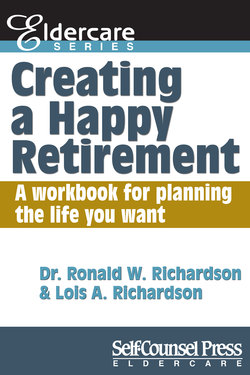Читать книгу Creating a Happy Retirement - Dr Ronald W. Richardson - Страница 7
На сайте Литреса книга снята с продажи.
What Makes Us Happy?
ОглавлениеThe social philosopher and critic Eric Hoffer said, “The search for happiness is one of the chief sources of unhappiness.” We agree. As a marriage and family therapist, Ron saw this over and over again in his practice. Clients would come in and say, in various ways, within varying circumstances, “I just want to be happy. I have tried everything. I have been to all sorts of programs, been to various churches, read all of the books, sat with many gurus, gotten married, gotten divorced, had children, taken a new job and I am still not happy.” Ron would say something like, “Well, let’s look at how you are living your life.” Thus, the counseling process would begin.
The American Declaration of Independence, written primarily by Thomas Jefferson, says that people have “certain inalienable rights” to “life, liberty, and the pursuit of happiness.” The author declared these rights in the context of not having them, as a foreign government imposed its directives on the American colonists. They felt they should be free to choose how they would live and what would make them happy. Notice that only the “pursuit” was guaranteed, not the acquisition of happiness. (The Canadian Charter of Rights and Freedoms on the other hand only promises “life, and liberty and security of the person.”)
Most of us in the West have the freedom to pursue happiness. We do it in all sorts of ways, often without success, as many unhappy people will tell you. This book looks at the pursuit of happiness in the Third Age and what makes for a happy retirement.
As the Eric Hoffer quote implies, happiness is a by-product. We do not go directly to the Kingdom of Happy when we retire. It happens, or not, as a result of something else. It is about what other goals we have and how we go about achieving those goals. Goals, even when achieved, can be more – or less – satisfying. Many have said, for example, “I want to be a movie star. Then I will be happy.” That is their goal. A few people get there. Then some of these discover they are still not happy. Other people with other goals in life have achieved them only to discover, “No, this has not made me happy.”
Some have wondered what Jefferson meant by “happiness.” Years later in 1819, interpreting his own phrase, Jefferson wrote, “Happiness is the aim of life, but virtue is the foundation of happiness.” He might have had in mind virtues like kindness, love, forgiveness, hope, zest for life, humor, gratitude, temperance, courage, justice, transcendence of self, aesthetic appreciation, self-regulation, perseverance, prudence, and good relationships with family and friends.
Whatever the particular virtues, Jefferson was asserting that happiness depends on people’s character. We build character through living a life of principle. Happiness results from and consists of the principles we choose to live by and how well we can hold to those principles.
Many people think of happiness as a feeling. They seek good feelings from experiences, from how much they earn, from where they live, or what sort of house they have, or neighborhood they live in, or who loves them, or who they are married to, or how many people are on their Facebook page, etc., etc. These things do not make us happy. They are external to who we are. Ron’s therapy practice was located in one of the wealthiest parts of Canada and he saw the evidence for this truth every day. It is what is inside us that counts. Happiness is a matter of being, not having.
If we depend on other people or outside circumstances to make us happy, it will never work because it will never be enough. Someone asked one of the first Rockefeller tycoons, “How many millions are enough?” The implication of the question was, “When will you be satisfied?” He replied, “Hmmm. Just a few million more.” Whatever level of income we have in life, we often think just a bit more would make us truly happy. Not so. Look at how many lottery winners are still unhappy.
If we focus on what we do not have, instead of what we do have, we will be dissatisfied. The grass can always look greener elsewhere. A New Yorker magazine cover showed the intersection of four backyards in a suburban neighborhood. The four grass yards were slightly different shades of green. Standing in the yards, each owner was looking over a fence to the neighbor’s yard, with a look of envy for the other’s shade of green.
Do your plans for retirement focus only on what you will have financially or materially, or where you will live, or what you will do, or are they inclusive of who you are? A happy retirement is not a commodity one can buy and sell. It cannot be bought in a store or a program or even produced in a book like this.
Who you are is the key. Only you can decide what kind of person you want to be and define your goals (within the framework of your marital and family relationships). It’s up to you to decide how you want to live and relate to others.
